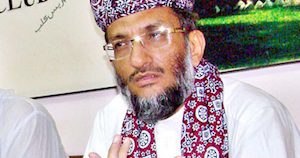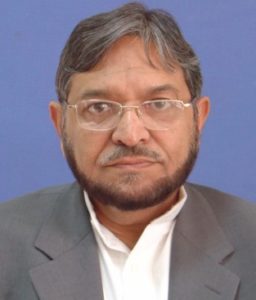How Will the PPP Deal with this Murderer?
 Today, we find the need to ask whether committing a murder is wrong. And whether the act should be condemned or not. In fact, murderers are lauded and showered with flowers, and Facebook pages are created hailing assassins.
Today, we find the need to ask whether committing a murder is wrong. And whether the act should be condemned or not. In fact, murderers are lauded and showered with flowers, and Facebook pages are created hailing assassins.
And why wouldn’t such views and conduct prevail, why wouldn’t the killer Malik Mumtaz Qadri be treated as a hero when mainstream religious party members, such as Sahibzada Zubair of the Jamiat Ulema-e-Pakistan, categorically state on national television that Salmaan Taseer’s death was God’s verdict and nobody who loves the Prophet (PBUH) could or should condemn his murder? Or those like Maulana Fazlur Rahman, or Jamaat-e-Islami’s Farid Ahmed Paracha, who, while not out rightly stating that the murder should not be condemned, concede in no uncertain terms that the governor had injured the sentiments of thousands of Muslims in Pakistan and that this was bound to happen.
On news talk shows, even those who do not belong to the religious parties were found deliberating more on what led to Governor Taseer’s death — i.e. his speeches against the Blasphemy Law and in support of Aasiya Bibi — than the act of murder, or the manner of killing. Additionally, over 500 “religious” men maintained that Taseer’s funeral must be boycotted. Talk on Twitter has it that the Badshahi mosque imam refused to pray Taseer’s namaz-e-janaza. Some accomplishment then that thousands turned up for the governor’s funeral — with the exception of both the Sharif brothers who were advised against going for “security reasons,” and the president — and that he was buried with full state honours.
And despite the obvious fear of attacks against those publicly showing solidarity with the slain governor and his family, members of civil society did venture out for vigils in Islamabad, Karachi and Hyderabad.
In the nation’s capital, they gathered at Kohsar market, where the deadly incident took place, while in Karachi and in Hyderabad, the vigil-turned-protests were held at the cities’ respective press clubs. These people were not PPP voters or supporters, nor necessarily fans of Salmaan Taseer’s politics, but conscientious members of civil society who stood their ground to denounce his assassination, and call what is wrong, wrong.
With Governor Taseer’s example before us — and the reaction following his murder — the obvious message being sent out is that free speech and dissenting opinion will be silenced with a bullet. Religious political parties have stated that if other untoward incidents — like Taseer’s death — are to be prevented, then Sherry Rehman should withdraw her bill from the assembly and the Blasphemy Law debate should be dropped altogether. Of course, Babar Awan and Rehman Malik have already given their assurances that the Blasphemy Law will not be touched. How can we forget Babar Awan’s recent statement: “In my presence as the Law Minister, no one should think of finishing this law.”
 The same people who were quick to criticise Taseer’s step to seek a presidential pardon for Aasiya Bibi instead of trusting the legal process and the court system are now, conveniently, promoting vigilantism. Previously there were clerics announcing head money for both Aasiya Bibi and Taseer. Now, on national television, Qadri’s intent, and not his act, is the focus of discussion, and the murder is being justified on religious grounds. The Sunni Tehreek has gone so far as to say, “We will provide legal and constitutional protection to Mumtaz Qadri.”
The same people who were quick to criticise Taseer’s step to seek a presidential pardon for Aasiya Bibi instead of trusting the legal process and the court system are now, conveniently, promoting vigilantism. Previously there were clerics announcing head money for both Aasiya Bibi and Taseer. Now, on national television, Qadri’s intent, and not his act, is the focus of discussion, and the murder is being justified on religious grounds. The Sunni Tehreek has gone so far as to say, “We will provide legal and constitutional protection to Mumtaz Qadri.”
This is a huge cause for concern as such talk has already influenced the minds of many and continues to have the same effect. More and more people are buying into the view that discussion and debate on the Blasphemy Law is forbidden, and anyone who so much as raises questions is somehow guilty of blasphemy and must be killed. Those who dare to venture that taking the law into one’s own hands is against the teachings of Islam and the exact opposite of what Prophet (PBUH) preached are silenced on the premise that they are not an “authority” on religion.
The real message of Islam is thus being lost and there is no room left for discussion. But that doesn’t seem to be perturbing too many people who are willingly — or unwillingly — yielding their right to think, or to hold a different opinion, and follow the spirit of their religion.
What is of importance now is this: what course of action will the PPP now take with regards to the murderer?
When Benazir Bhutto was killed, the PPP claimed that since they weren’t the ruling party they had no control over the investigations. Moreover, the party claimed that by the time the UN probe could uncover anything, all evidence had been swept away. Taseer’s murder, unlike all other assassinations in which the killers remain unknown, is different. In this case, the killer is in police custody, he was seen committing the crime and has confessed to it. What more is required for a trial and conviction?
Law-enforcement agencies, courts and the PPP have been put to the test. Whether they are committed to providing justice and doing the right thing, or prefer to appease others and save their own skins, remains to be seen.
Farieha Aziz is a Karachi-based journalist and teacher. She joined Newsline in 2007, rising to assistant editor. Farieha was awarded the APNS award for Best Investigative Report (Business/Economic) for the year 2007-2008. She is a co-founder and Director at Bolo Bhi, an advocacy forum of Digital Rights.



